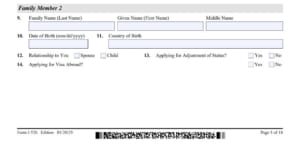Are you a lawful permanent resident (“LPR”) of the United States and want to become a U.S. citizen? If you have been a resident for at least 5 years, or 3 years if you obtained your LPR status through marriage to a U.S. citizen, then you may be eligible for “naturalization”, the process for becoming a U.S. citizen.
 One of the requirements to qualify is that an applicant for naturalization generally must have resided “continuously” in the United States after his or her lawful permanent resident (“LPR”) admission for at least 5 (or 3) years prior to filing the naturalization application (residence must continue until the applicant is naturalized), but an absence from the United States for more than 6 months but less than 1 year during that 3 or 5-year period triggers a presumption of a break in the continuity of residence.
One of the requirements to qualify is that an applicant for naturalization generally must have resided “continuously” in the United States after his or her lawful permanent resident (“LPR”) admission for at least 5 (or 3) years prior to filing the naturalization application (residence must continue until the applicant is naturalized), but an absence from the United States for more than 6 months but less than 1 year during that 3 or 5-year period triggers a presumption of a break in the continuity of residence.
U.S. Citizenship and Immigration Services (“USCIS”) has recently issued policy guidance in the USCIS Policy Manual to address naturalization applicants’ absences from the United States of more than 6 months but less than 1 year during the statutorily required continuous residence period.
The Policy Manual addresses when an applicant who has broken his or her continuous residence may reapply for naturalization and clarifies that:
- Naturalization applicants absent from the United States during the statutory period for more than 6 months but less than 1 year, must overcome the presumption that the continuity of residence has been broken in order to remain eligible for naturalization; and,
- An applicant who USCIS determines to have broken the continuity of residence must establish a new period of continuous residence; the requisite duration of that period depends on the basis upon which the applicant seeks to naturalize (three or five years).
If you are an LPR and are unable to return to the U.S. within 6 months of your departure, this presumption will apply to you and may disqualify you from naturalization, or worse, reset your “resided continuously” clock back to the start of 3 or 5 years.
For more information, contact us at info@enterlinepartners.com and speak with one of our U.S. immigration lawyers in Asia at our offices in Ho Chi Minh City, Manila and Taipei.
ENTERLINE & PARTNERS CONSULTING
Ho Chi Minh City, Vietnam Office
Ad: 3F, IBC building, 1A Cong Truong Me Linh Str., District 1, HCMC, Vietnam
Tel: +84 933 301 488
Email: info@enterlinepartners.com
Facebook: Enterline and Partners-Đầu Tư Định Cư tại Mỹ
Website: http://enterlinepartners.com
Manila, Philippines Office
Ad: Unit 2507 Cityland 10 Tower 1, 156 H.V. Dela Costa Street, Makati City, Philippines 1209
Tel: +632 5310 1491
Email: info@enterlinepartners.com
Facebook: Enterline and Partners Philippines
Website: https://enterlinepartners.com/language/en/welcome/




